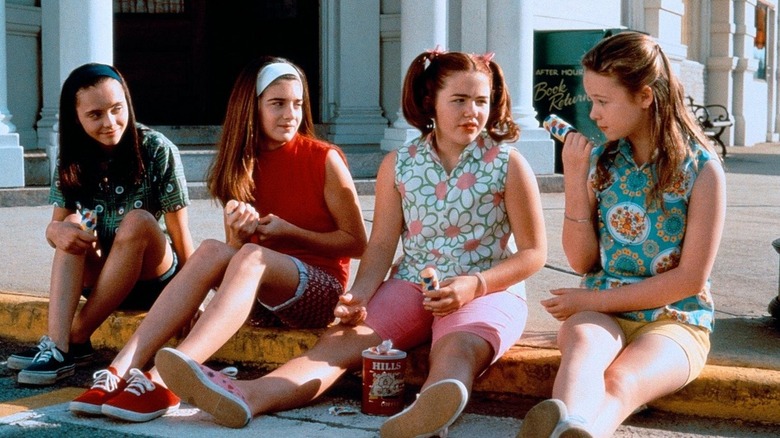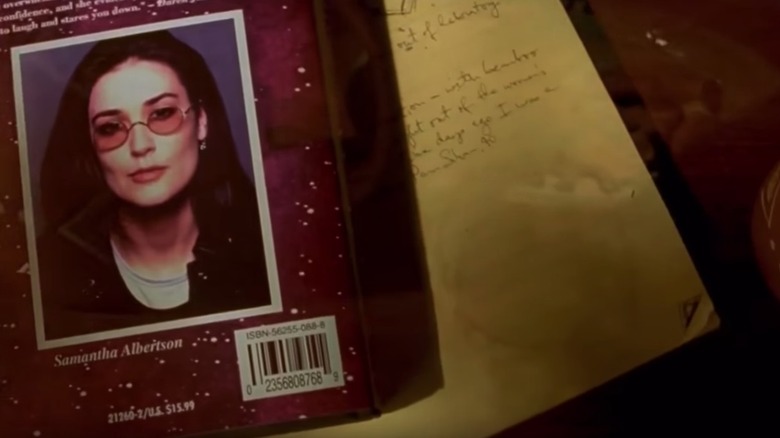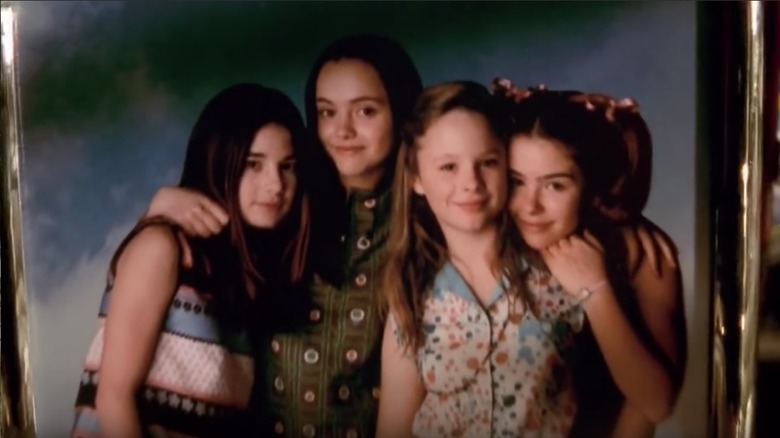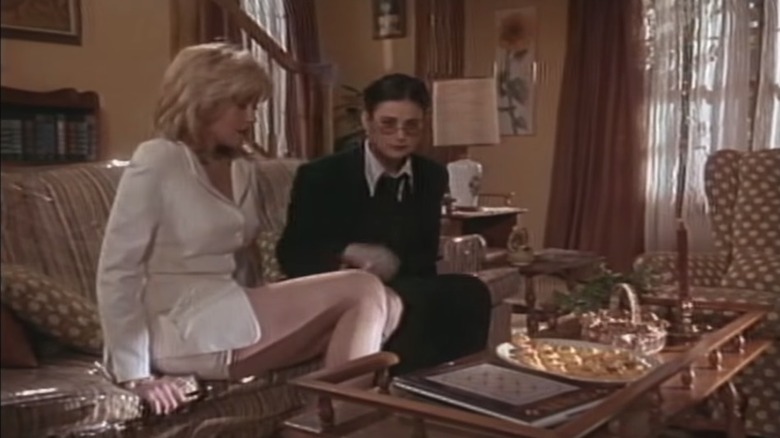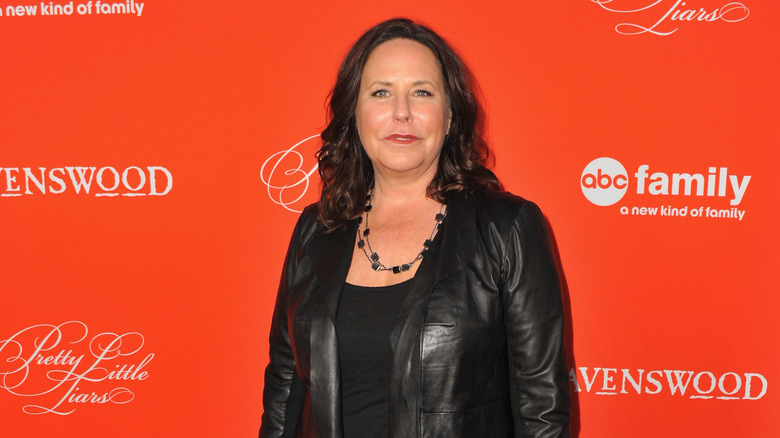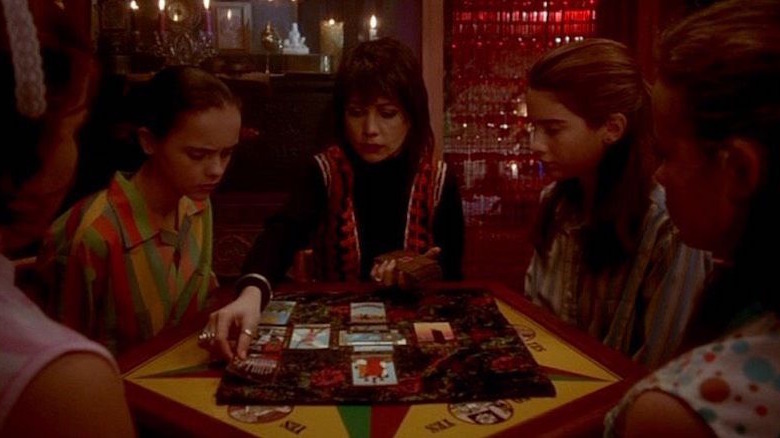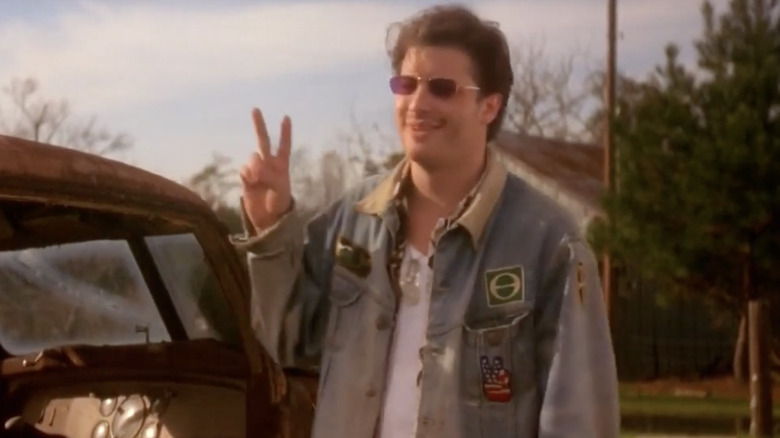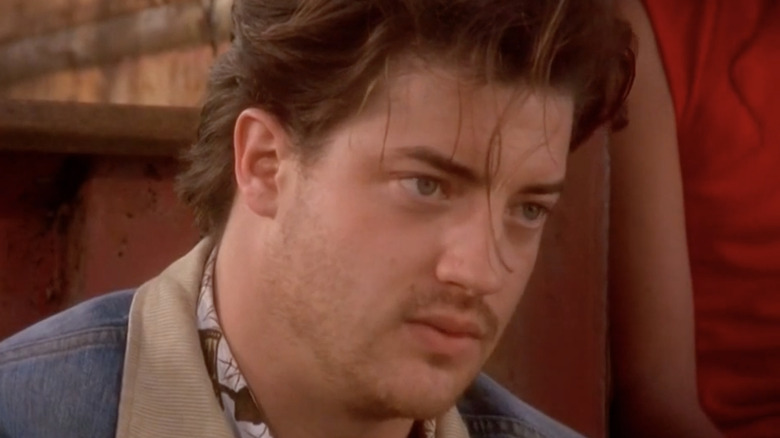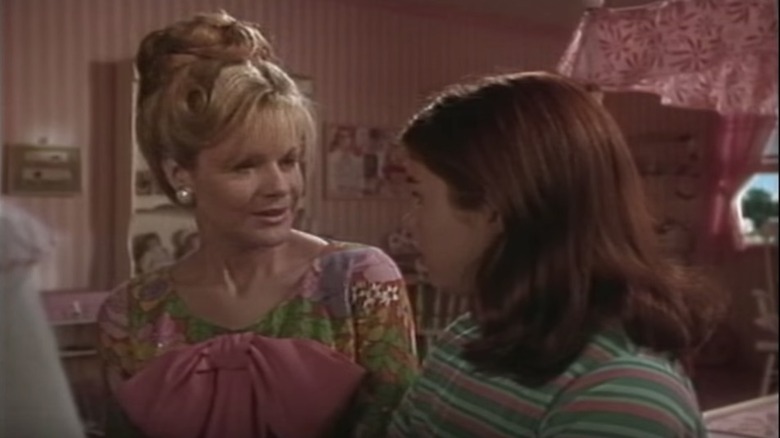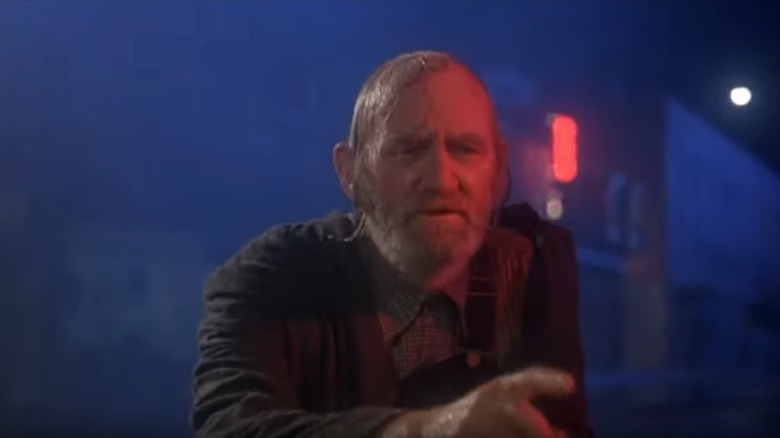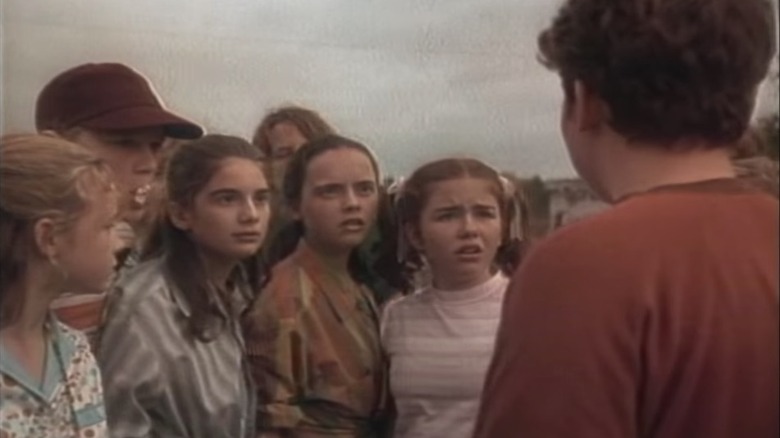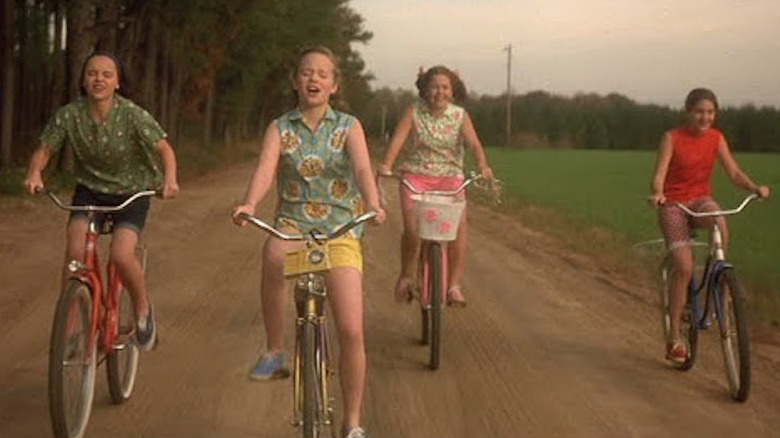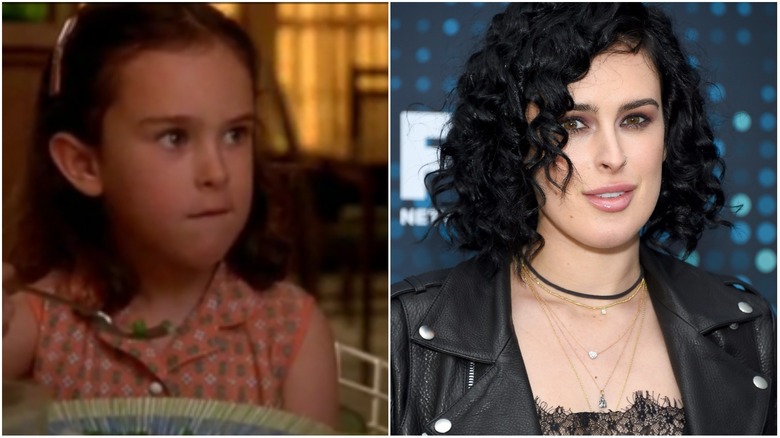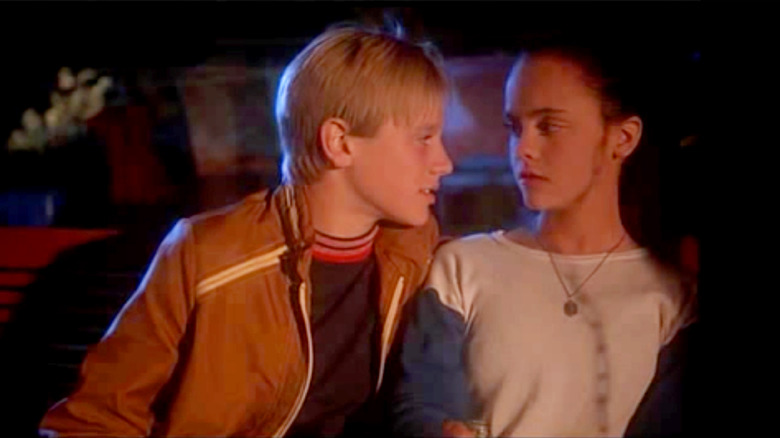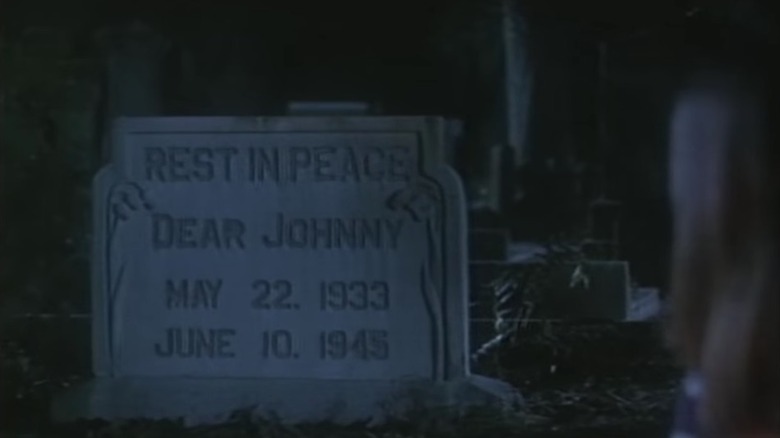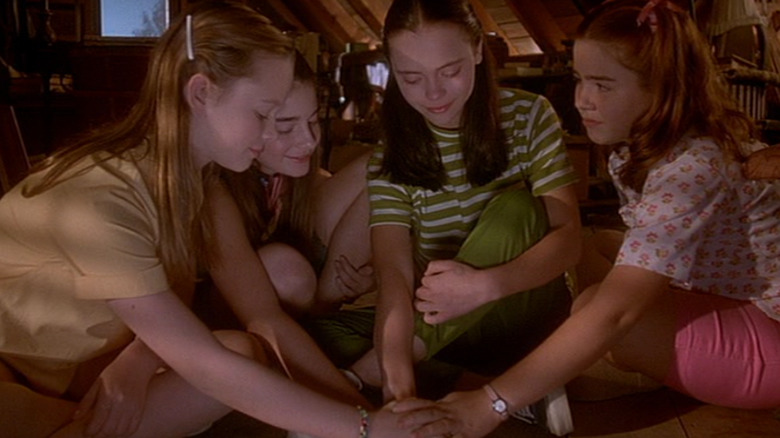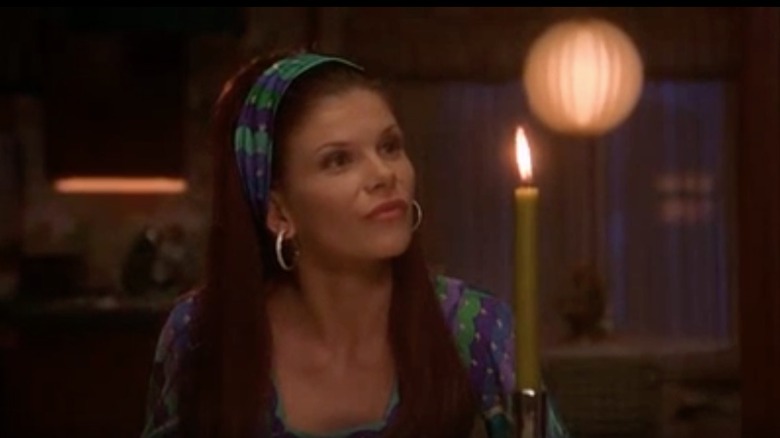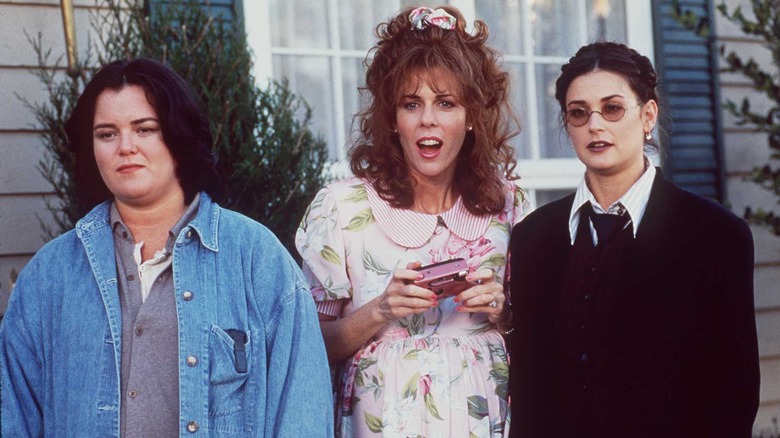Things About Now And Then You Only Notice As An Adult
In Lesli Linka Glatter's Now and Then, four best friends Samantha (Gaby Hoffman), Roberta (Christina Ricci), Teeny (Thora Birch), and Chrissy (Ashleigh Aston Moore) make a pact that no matter what happens they will always be there for each other after the intense summer of 1970 that marked the end of their childhoods. Twenty-five years later, the four now-adults reunite in their hometown of Shelby, Ind. to support Chrissy, played by Rita Wilson, as she gives birth to her first child.
Older Samantha, portrayed by Demi Moore, is a bestselling sci-fi author, Teeny, played by Melanie Griffith, is an award-winning actress, and Roberta, a role taken on by Rosie O'Donnell, is Shelby's resident OB/GYN, who remained in town along with Chrissy all these years. Flipping between the past and present, Now and Then compassionately explores the lives of these 12-year-old girls as they begin a quick ascent to adulthood during that fateful summer, experiencing events that would shape them for the rest of their lives.
While Now and Then may seem like a lighthearted coming-of-age dramedy on the surface when watching as a kid, adult will notice much darker themes emerge that add worlds of nuance to the story. Here are the things only adults notice in Now and Then.
There are a lot of outdated objects and behavior in Now and Then
In many ways Now and Then is a veritable time capsule, not just of 1970, but also of the year the film was released, 1995, which is a major thing adults notice in the movie that youngsters might not. Archaic objects like battery-powered transistor radios, rotary phones, non-electric vacuum cleaners, and even non-digitized library newspaper archives bound in leather were all in common use back in the 1970s before technology began its leaps forward.
Only adults would also notice the now-defunct Yardley Cosmetics on Chrissy's vanity, how a print version of TV Guide is only 99 cents and Sam's hardcover book is $15.99, and that Sam uses a paper map to navigate. That's not even mentioning the answering machines and the VCR in Teeny's limousine. All relics now.
But what's almost more striking is how much has changed behavior-wise since 1995. Chrissy douses her hair with Aquanet hairspray even though she's about to have her baby at any moment, something adults know today could be toxic to the unborn child. Worse, Sam is a chainsmoker, and she and Teeny smoke around pregnant Chrissy without anyone mentioning it. To kids, this may look bizarre, but, to adults today, we know just how risky those behaviors were, though, if you lived through those times, it was considered normal.
Now and Then shows how people communicated before social media
One of the most remarkable things about Now and Then is that the 1970s flashback scenes, in particular, are a testament to analog ingenuity when it comes to after-hours communication. Back then, families only had one telephone, and there were rules about the cut-off times for receiving or making phone calls — unless it was an emergency or it was related to homework. To work around this absolute inconvenience, Sam, Teeny, Roberta, and Chrissy have an elaborate system of pulleys and bells, flashing lights, and walkie talkies in case they needed a late-night meet-up.
Sam's house is connected to Roberta's by a rope with bells on both ends, which Sam pulls on. Roberta then alerts Teeny by flashing a light in her window, and Teeny calls Chrissy on a walkie-talkie. While modern smart phones mean that people can message their best friends across the country any time, there is something beautiful in the simplicity of the girls' manual comms that adults watching Now and Then could only appreciate.
Chrissy keeps her childhood home the same in Now and Then
Now and Then is a film about how our childhoods seep into our adult lives, and Chrissy, in particular, exists in a kind of arrested development even as she's about to become a mom herself. She continues to live in her childhood home, and she keeps it exactly as her mother, played by Bonnie Hunt, did. She even has her couch wrapped in plastic.
Chrissy doesn't allow swearing in the house — and she considers the word "breast" to be a swear — or hard liquor. The $129.98 Sears treehouse they bought in 1970 has lasted for 25 years, and Chrissy refuses to tear it down. She also keeps the radio tuned to the '70s oldies station, as if she's just as much of a time capsule as her home. Yet Chrissy sees her behavior as perfectly normal and even goes so far as to accuse Sam and Teeny of being bizarre. "The longer they're gone, the weirder they get," Chrissy says to Roberta as she judges Teeny's multiple marriages and Sam's chic wardrobe of black clothes. No wonder Samantha and Teeny exchange their fair share of eye-rolling as they listen to Chrissy.
Now and Then's common thread with Pretty Little Liars
Did you notice which big Hollywood writer-producer's name rolled by in the beginning credits of Now and Then? If you said I. Marlene King, you're right — and probably a fan of Pretty Little Liars, another series about a steadfast group of girlfriends that King created. But unlike PLL, which ran from 2010 to 2017, Now and Then came at the beginning of King's career.
"I was just starting out as a writer, and had taken a lot of classes, and people said write what you know — and I decided to write about the summer when my parents got divorced, which was the summer of my 12th grade year. A lot of the movie was really what we were going through back then," she revealed in an interview with Entertainment Weekly. According to King, many elements from the movie were pulled straight from her childhood, including the girls' Gaslight Addition neighborhood and the cemetery séances.
Janeane Garofalo cameos as a surly waitress-slash-fortune-teller in Now and Then
Janeane Garofalo's star was just beginning to rise when she snagged the role of Wiladene in Now and Then — a cantankerous waitress at the diner the girls frequented, and one who happened to dabble in fortune telling on the side. It was a bit part for Garofalo, who'd starred in another cult '90s hit the year before: Reality Bites. However, the small role still established a rapport between Garofalo and the younger actresses she filmed alongside. In 1999, Christina Ricci alluded to that connection, explaining that Garofalo had come to her defense when the media began singling her out over her size.
"I was so happy to read an US interview where Janeane [Garofalo] said it was ridiculous that I always get slammed for my weight because, in real life, I'm not fat. At all," Ricci told Moveline at the time. "Maybe short, but not fat. And I do have a neck."
Tarot cards aren't terrifying for an adult watching Now and Then
In 1970, after a nighttime seance that the girls believed brought back the spirit of Dear Johnny, they do everything in their power to find out what happened to him. At the Greenfield Library, they find pages about his murder torn out of the archives, and none of the adults will tell them about what occurred.
So, they go visit Wiladene, Shelby's resident psychic to see if she has any answers. Wiladene pulls out her Tarot deck and does a reading for the "boys," what she insists on calling Sam, Roberta, Teeny, and Chrissy. There's a dramatic moment where Wiladene pulls the Death card. The somber mood deepens when she pulls the Ten of Swords, with its imagery of a man with a back full of swords. As a kid watching Now and Then, these cards seem like omens. But actually, the Death card is a powerful pick that signifies a need for change and transformation, and the Ten of Swords relates to the need for you to "protect yourself while the storm rages" and prepare to restart again. Yes, these can both be scary things, but they are not harbingers of actual doom.
Everyone smoked in Now and Then
It wasn't just the adult versions of the girls who smoked cigarettes in Now and Then. It was also the some of the girls' parents... not to mention the young versions of the girls, too! Although there was no literal statement made on behalf of the movie about this habit shared by so many characters, the movie itself may have been making a social statement.
In 1995, when the film was released, the Center for Disease Control and Prevention (or CDC) released a report on the problem with minors accessing tobacco products. And, according to an article in the National Academies Press on the background of smoking bans, the early '90s saw the first large wave of restrictions regarding smoking in public spaces.
Regardless of the intention behind the characters smoking, at least one critic took the film to task for it. In his negative review of Now and Then, Roger Ebert panned the proclivity as part of a bigger cinematic issue. "In theory we might be interested in seeing what kind of women the girls grew up to be — but the movie gives the adults so little screen time that it has to resort to shorthand, like using smoking as a character trait."
The Vietnam vet scene in Now and Then is touching, but it's also problematic
On their way to research Dear Johnny's death, the four youngsters run into a Vietnam veteran, played by Brendan Fraser, who's hitching a ride. Roberta asks if he killed anyone. "Not because I wanted to," he responds. One of the girls asks, "But we're winning, right?" He replies, "Nobody's winning." The girls (except Chrissy) share a smoke with him as he dives deeper into why war is wrong.
Budding cynic Roberta says nobody can believe in anything anymore. He responds, "You can believe in yourself. If you're lucky." And when Chrissy accuses him of being a "sex fiend," which is something her mother said about hippies, his retort is gold: "Your parents aren't always right." It's a beautiful exchange that adds to the time capsule feel of Now and Then, inserting important social and cultural events of the day into the story.
That said, a grown man hanging out with 12-year-olds — and giving them cigarettes, to boot — sets off an entire line-up of red flags for any adult watching this movie.
The truth about Brendan Frasier's Now and Then character
Watching Now and Then as a teen or preteen in the mid-'90s, it was easy to swoon over the drifter played by Brendan Fraser. Watching as an adult, though, it's clear Fraser wasn't just eye candy, given his character's past war experience.
In an interview with Entertainment Weekly, Now and Then's writer I. Marlene King discussed the dichotomy of idealism and transition during the '70s. "It was a very special time to grow up. And there's a hint of how the world is changing when the girls meet the Vietnam vet played by Brendan Fraser on the road, and they think that everything is all hunky-dory but he sort of opens the window to the fact that things are changing," she said.
Of the movie, Fraser said (cryptically, much like his character), "That I think speaks to everyone who's kept little bits and pieces of the world to keep themselves together... I think the lesson in that is we are who we are no matter what we are, and we are the sum whole of — not everything we collect, but — our experiences."
In Now and Then, it's clear that childhood traumas carry into adulthood
In Now and Then, Chrissy's adult neuroses start in the summer of 1970, as does Sam's. When Chrissy broaches the subject of sex with her mom, her mom explains sex as, "All women have a garden. And a garden needs a big hose to water it. Or a small hose, as long as it works." Yikes. As a result, Chrissy becomes obsessed with gardening and essentially becomes her own mother. When Sam's parents' divorce was announced that summer, she became unable to trust. Of her inability to commit, she confesses as an adult, "I've been so afraid of the bad things ... that I missed out on the good."
Teeny was always a cynic, even as a kid, thanks to her hands-off parents about whom she quips, "I don't really know my parents. As far as I can tell they are a**holes." Later in the summer of 1970, Teeny says to Sam, "There are no perfect families. It's normal for it to be s***ty." Already an old soul at 12, Teeny channeled the big energy of her parents' negligence as a kid into her acting career as an adult.
The adults' traumas resonate differently in Now and Then
It wasn't only the youngsters going through it in 1970. Sam's mother, played by Lolita Davidovich, was learning how to be a single mom before that was commonly accepted in society. But it's the Pete Simms (Walter Sparrow) sub-plot that packs an emotional wallop in Now and Then. Called "Crazy Pete" by townspeople because he only comes out at night, Pete had experienced great loss when his wife and child were murdered in a random robbery. The 1945 incident was decades in the past, but he was still actively grieving and living with guilt that he might have saved his family if he'd been home.
Pete only goes out at night, telling Sam, "I don't like to see a lot of people. I don't think they like to see a lot of me." Later, Pete also tells her, "Things will happen in your life that you can't stop. But that's no reason to shut out the world."
Sam reflects as an adult, "Although I understood the importance of his words, it's only now looking back that I understand their meaning." Watching as an adult, Pete's words do resonate differently.
There's some unfortunate shaming in Now and Then
One of the cool things about a time capsule of a movie like Now and Then is it can show us how far we've come as a society when it comes to certain behaviors. Watching the movie as an adult, it's unfortunate to hear all the fat-shaming that Chrissy receives by her enemies and her best friends, even though she's not even fat. Asked which friend she'd eat if they were starving, Sam jokes behind her back, "Chrissy, because she'd feed more people." On another occasion, Teeny says straight to Chrissy's face, "You are fat."
Chrissy does her fair share of shaming on her own, though. She shames tomboyish Roberta, saying, "Why can't you just act like a girl?!" And this sentiment is echoed by one of the baseball bullies who taunts Roberta with the statement, "Too bad your mom's dead. Someone needs to teach you to act like a girl!"
And poor Pete, whom everyone calls "crazy," isn't actually crazy at all. He's an old traumatized man still grieving the loss of his family and has been socially ostracized by the town.
Now and Then features some incredibly risky behavior for young girls
Many would argue that 1970 was a safer time, so kids gadding about on their own wasn't a big deal. However, Shelby, Ind. had been home to a brutal double murder in 1945, as shared in the movie, so that point becomes moot. It gets disturbing watching the girls in Now and Then sneak out of their homes often at night to have seances in the local cemetery, and one night they even go in their pajamas. After one nighttime jaunt to visit their tree house prototype (which they climbed the fence into Sears Gardening to do), Samantha and Teeny get caught in a rainstorm, and Samantha almost drowns in the sewer.
They take shortcuts through the woods at night, and they ride their bikes nine miles to the next town without even telling any adults where they are going. As she processes her grief over her mother, Roberta enacts elaborate faked death attempts and, after Roberta pretends to drown, Chrissy gets so mad that she punches her in the face. The girls even break into Sam's grandmother's attic and climb onto her roof as they investigate the cause of Dear Johnny's death. A lot happened to them that summer, and it's a miracle they all lived.
In Now and Then, the girls were watching Love Story in the tree house
When it was released in 1970, Love Story wasn't exactly a movie marketed for preteens and teens. Starring Ali MacGraw and Ryan O'Neal, it was the kind of flick you might catch your mom watching after you went to bed, trying to muffle her sobs with a floral throw pillow. But, sure enough, it is the movie the girls watch on the projector screen when they try out their tree house. That doesn't mean the real-life young actors starring in Now and Then were watching the same, though.
"Pulp Fiction came out that summer and while we were shooting it [Christina Ricci and I] went and saw it four, five, six times," Now and Then actor Devon Sawa shared with Us Weekly. Sawa's co-star, Gaby Hoffmann, confirmed the young stars' obsession with the edgy film during an interview with The Washington Post, saying she and Ricci "spent our weekends going to see Pulp Fiction and smoke cigarettes in the alley."
Little Rumer Willis was her mom's co-star in Now and Then
With parents like Demi Moore and Bruce Willis, Rumer Willis was bound to have acting in her blood. Over the years, she has enjoyed roles in top TV series such as Hawaii Five-O and Empire, but her career actually kicked off with a minor role in Now and Then as Samantha's little sister, Angela. Since Moore played the adult version of Samantha, that means little Rumer played the sis of her real-life mom.
Of the role, Willis told Elle, "My dad says I was an extra in Die Hard. I think it's true. But Now and Then was the first real thing. I loved it. All these amazing people. I was the tiny little seven-year-old on set and everyone was always like, 'Oh, you're so cute!' I just really liked being on set because I had grown up doing it."
The language in Now and Then was salty for a teen film!
From Melanie Griffith's adult Teeny hollering, "Hey, b***hes" to Devon Sawa's young Scott yelling, "Give us our clothes back, damn it," Now and Then is chock-full of adult language. Watching it as a preteen or teen in the '90s, that probably made you feel pretty cool. Watching it as an adult, though, you may find it surprising the film managed to rack up so many expletives. However, the salty language didn't interfere with the movie's PG-13 rating. In fact, Common Sense Media deems it appropriate for ages 12 and older.
Now and Then features a perfect model of consent
It's quite a delicious bit of irony that tomboy Roberta, who binds her chest with masking tape over her bra and wears her brothers' hand-me-downs, would be the first to see actual romantic interest from a boy. In Now and Then, Roberta and her besties have a sworn enmity with the Wormers, a group of brothers lead by the eldest, Scott (Devon Sawa), in their neighborhood who get their kicks by terrorizing anyone who's around — especially girls.
One evening during that eventful summer of 1970, Scott runs into Roberta as she's practicing basketball. Without his brothers in tow, he's actually kind of a nice guy, and, as he and Roberta connect on a slightly deeper emotional level, he asks Roberta if he can kiss her. The ask is super awkward, but, as the exchange continues it becomes a perfect model of consent culture that is way ahead of its time.
First Scott mumbles, "Can I kiss you?" He then enunciates when he asks again. Roberta considers his question and accepts. But she didn't realize she was saying yes to a kiss right then, so they clarify the terms and have a sweet lip-lock moment that both have agreed to.
In Now and Then, Devon Sawa and Christina Ricci made the cutest couple — again
Mere months before Now and Then hit theaters in October of 1995, another beloved '90s film had its release in May. That film, Casper, also happened to star Christina Ricci and Devon Sawa — her as the daughter of a paranormal investigator, and Sawa as the human form of the friendly ghost inhabiting the dad and daughter duo's new home. Who could forget the scene in the movie during which Ricci and Sawa slow dance and share a sweet kiss at her Halloween party? After all, it spawned the best pick-up line of all time: "Can I keep you?"
Ricci and Sawa sharing another kiss in Now and Then (which he says, despite him being older than her, wasn't awkward at all) sent teen hearts a'flutter and, as a byproduct, led to rumors of a real-life romance between Ricci and Sawa. But in an interview with Us Weekly in 2016, Sawa set the record straight. "That story of all the Now and Then girls fighting over me was a little blown out of proportion," he explained. "Someone had written that me and Christina [Ricci] had a thing, which wasn't true. We were all so young and so innocent."
The Dear Johnny plot in Now and Then mirrors In Cold Blood
One thing in Now and Then that only adults would notice is the Dear Johnny storyline mirrors that of Truman Capote's In Cold Blood. In Cold Blood is a true crime book about the random brutal killings of an entire family by two drifters in Holcomb, Kan. in 1959. It invented the genre of creative non-fiction and shocked America as it described violent crime not in an urban context, but rather a small-town one, shattering many Americans' illusions of safety in their own towns.
In Now and Then, it was also a drifter who passed through Shelby, Ind. in 1945, who shoots Dear Johnny and his mother for what little they had in the house. In Now and Then the town is rocked by the crime, but, in the years after, the townspeople try to pretend it never happened. Part of that includes ostracizing the surviving family member, Pete Simms. This parallel to In Cold Blood only deepens the darker aspects of Now and Then and further puts them in a broader social and cultural American context, heightening the time capsule feeling of the movie.
The gutter scene gives off major It vibes
If the scene where Gaby Hoffmann's character, Samantha, gets swept down into a rain gutter seems eerily familiar, well, there's good reason. The scene hearkens It, the classic 1990 horror flick, which was rebooted in 2017. Georgie's yellow raincoat from It is practically a dead-ringer (no pun intended) for Teeny's, and they even call out in distress nearly the same way. While it's uncertain whether or not the Now and Then scene was an actual nod to the Stephen King adaptation, an interview with Hoffmann made it abundantly clear the scene was arguably just as much of a nightmare to shoot.
"That was a set — and at the end of the shoot — and I said, 'I'm not doing it unless you guys warm the water! I'm serious, I can't deal with it anymore, I will walk off set!' So they heated the water and I wore a wet suit," she revealed to Index Magazine. She also added that the rats trained for the scene got the true star treatment, divulging, "And the rats would get taken out, put in front of a heater, fluffed up — everyone would be waiting for this while I'm shivering and moaning, and I thought, 'This is so insane, the rats are getting treated better than I am!'"
Now and Then's soundtrack features iconic hits from the '60s and '70s
For adults who remember growing up in the 1970s, the Now and Then soundtrack is a time capsule all of its own featuring an eclectic mix of songs that have become a kind of wallpaper to certain times and places. From the oldies of the Allman Brothers to Stevie Wonder, from The Jackson 5 to Nancy Sinatra, and from The Archies to The Hollies, these iconic tunes and musicians that drive the action in Now and Then are as catchy now as they were back then.
Even '90s staples Sophie B. Hawkins and Susanna Hoffs' appearances in the soundtrack for the modern scenes evoke a '90s Lillith Fair-esque vibe that differentiates the past from the present in a clever way through musical choices, even as Chrissy is stuck in the past with her '70s radio station as a grown-up. For adults watching Now and Then, these songs invoke our own childhoods and memories as much as they do Sam, Roberta, Chrissy, and Teeny's, both now and then.
Now and Then shows adults reaching their limits
For all of its dark themes about childhood trauma and that difficult metamorphosis into adulthood, Now and Then also has its fair share of hilarious moments that help lighten the mood. One of these happens after Sam's dad moved out and his mother, Grandma Albertson (Cloris Leachman), comes to their house demanding to be let in. Sam's mother hides under the kitchen table with her daughters, even as her mother-in-law screams that she can see them, until she finally leaves.
As a kid, it seems absurd that an adult would behave like this; adults are supposed to be better at communicating their issues, not avoiding them, right? But as an adult, it ends up actually making perfect sense that Sam's mom would be so backed into a corner that she felt she had no choice but to hide. After all, Sam's mom is a total badass with her Nancy Sinatra-inspired fashion sense and her bravery being a single mom in a community that judges her for it. Even she has her limits, though, and hiding under the table from her mother-in-law is what happens when she's reached it. Adults can absolutely relate.
The friends in Now and Then made a pact as kids and actually kept it
As kids, we all assumed we'd be best friends with our beloved childhood pals forever. There wasn't a shadow of a doubt in our minds. But as adults, this gets more and more complicated. In the days before social media and the internet, when people moved away, it was easier to lose touch than to stay connected. And for lots of adults who grew up pre-Internet, all the promises made as kids went out the window in the span it took for parents to bring home a moving truck with the announcement of a new job and city. Sometimes friends just grow apart.
"All for one, and one for all," Sam, Teeny, Chrissy, and Roberta promised each other that intense summer of 1970. They also made a pact that no matter what, if they needed each other, they would all be there. And as adults, they actually kept it. There is incredible magic in their connection and in the fact that they were able to maintain their bond, even if they don't always agree with each others' lifestyle choices. As an adult watching Now and Then, this is arguably the most powerful aspect of the movie.
